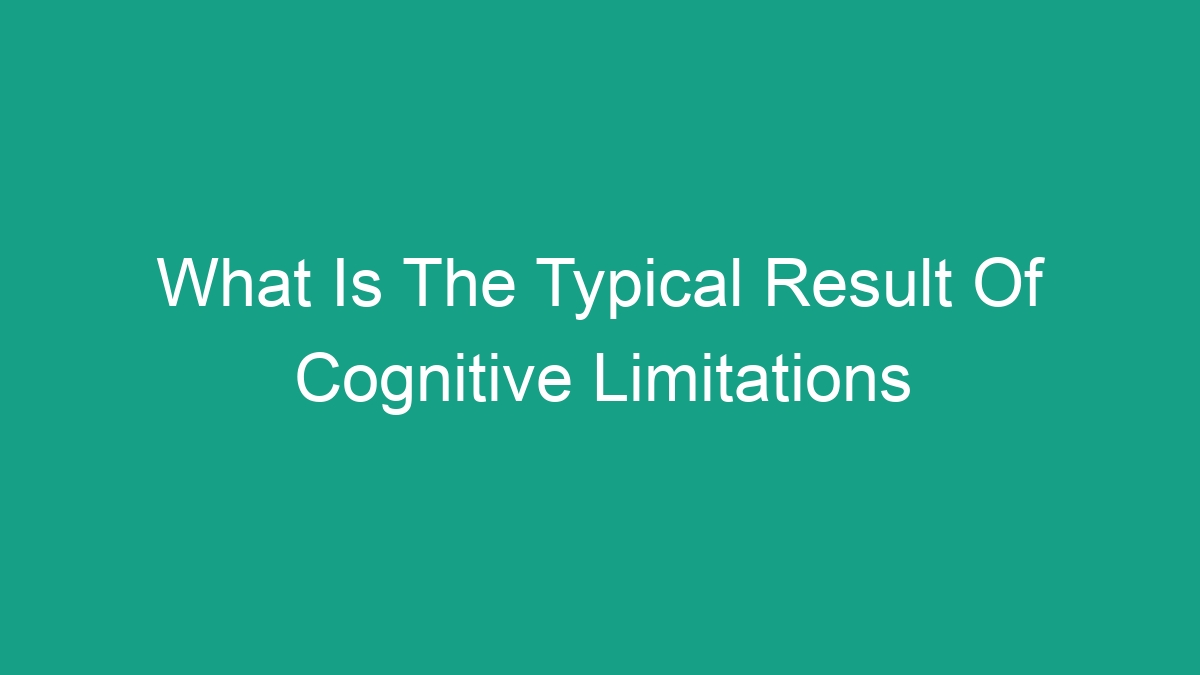
Understanding Cognitive Limitations
Cognitive limitations refer to the reduced ability of an individual to process information, recognize patterns, and problem-solve. This can result from various factors such as neurological conditions, brain injuries, developmental disabilities, or aging. Cognitive limitations can manifest in different ways, affecting an individual’s daily functioning, social interactions, and overall quality of life.
Typical Results of Cognitive Limitations
Individuals with cognitive limitations may experience a range of challenges that can impact their lives in significant ways. The typical results of cognitive limitations include:
- Impaired Memory: Difficulty in remembering information, events, or instructions.
- Reduced Attention Span: Inability to focus on tasks for extended periods of time.
- Difficulty in Learning: Struggles in acquiring and retaining new knowledge or skills.
- Impaired Problem-Solving Ability: Inability to effectively analyze and solve complex problems.
- Challenges in Communication: Difficulty in expressing thoughts or understanding others.
- Inconsistent Performance: Variation in cognitive abilities across different tasks or situations.
- Reduced Independence: Reliance on others for support in daily activities.
- Impact on Emotional Well-being: Feelings of frustration, anxiety, or depression due to cognitive struggles.
Managing Cognitive Limitations
While cognitive limitations can present significant hurdles, there are strategies and interventions that can help individuals cope and improve their functioning. These may include:
- Therapy and Counseling: Cognitive behavioral therapy and counseling can help individuals develop coping mechanisms and improve their emotional well-being.
- Memory Aids: Use of memory aids such as calendars, reminders, or electronic devices to support memory function.
- Cognitive Rehabilitation: Structured programs aimed at improving cognitive skills through targeted exercises and activities.
- Medication: In some cases, prescribed medication may help alleviate specific cognitive symptoms.
- Supportive Environment: Creating a supportive and understanding environment that accommodates the individual’s cognitive needs.
- Assistive Technology: Utilizing technology tools and devices designed to aid cognitive function, such as speech recognition software or smart home assistants.
Implications in Daily Life
Cognitive limitations can significantly impact an individual’s daily life in various ways, including:
- Work and Career: Difficulty in meeting job demands, learning new tasks, or maintaining productivity.
- Relationships: Strained interpersonal relationships due to communication challenges or cognitive inconsistencies.
- Self-care and Independence: Challenges in managing daily activities independently, leading to a reliance on others for support.
- Mental Health: Increased risk of experiencing emotional distress or mental health issues due to cognitive struggles.
- Social Participation: Limited engagement in social activities or community involvement due to cognitive barriers.
FAQ
Q: Can cognitive limitations be improved or overcome?
A: While cognitive limitations may pose significant challenges, various interventions and strategies can help individuals improve their cognitive functioning and quality of life. Cognitive rehabilitation, therapy, supportive environments, and assistive technology can all contribute to enhancing cognitive abilities and overcoming certain limitations.
Q: How do cognitive limitations impact academic performance?
A: Cognitive limitations can affect an individual’s ability to process information, learn new concepts, and retain knowledge. This can result in difficulties in academic settings, impacting performance in tasks such as reading, writing, problem-solving, and understanding complex instructions.
Q: What are some common conditions associated with cognitive limitations?
A: Cognitive limitations can stem from various conditions, including traumatic brain injury, Alzheimer’s disease, autism spectrum disorders, attention deficit hyperactivity disorder (ADHD), intellectual disabilities, and other neurological or developmental disorders.



